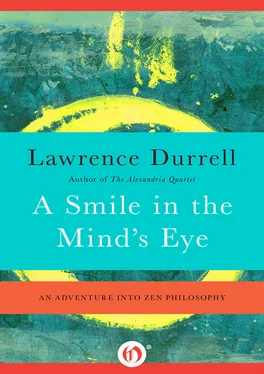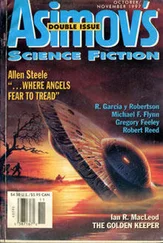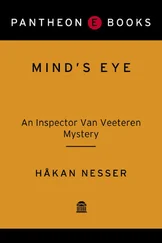One thing becomes clear: if the denial of the dogmatic principle is the key-note of the document, then what confusions there are operate always in the realm of the ethic. It is only here that the voice becomes muffled, that the statement, otherwise so pure in its lingual evasions of the rule, become muddy, ambiguous.
The struggle is directed always against the Confucian scheme, the precocious assumption of man over men, over God, over the spiritual landscape; and luckily for us the Confucian contribution serves admirably to light up for us those precise departments of the idea which might as yet remain obscure.
When a man with a taste for reforming the
world takes the business in hand, it
is easily seen that there is no end to it.
For spiritual vessels are not fashioned in
the world. Whoever makes, destroys;
whoever grasps, loses.
And again:
A sage is one who is full of rectitude,
but he does not, on that account, hack and
carve at others … He is upright and yet
does not undertake to straighten others.
In these two extracts from Lao Tsu his stance seems clearly enough defined. He refuses the dogma with its sharp black and white tones. Within the experience of which he talks there is room for infinite adjustment, infinite movement. The imposition of the iron scheme is a violence from which he utterly dissociates himself; his method is a wingless flying — an act which operates along a line where the mere mechanics of the act is lost; is irrelevant. His refusal to transform the flora and fauna of his world is a direct challenge to the world of dogmatic relations, where good is balanced against evil, black against white, being against non-being; the world of opposites, from which alone flowers the ethic, the canon, the principle. In his refusal to accept the limited concepts of language, he shows his wariness against the destroying, limiting effect of definition.
It is when we come to speak of Beauty as a thing
apart that we at once define Ugliness. So
when goodness is seen to be good, then we
become aware of what is evil … For this
reason the Sage only concerns himself with
that which does not give rise to prejudice.
He will not place himself at the mercy of the dogmatic principle, which, he realizes, can carry embedded in it the poisons of the divided personality, against which the volatile principle of being is at war. Consequently he sees that the ratiocinative principle itself must go; and as the document closes, this is the note which is sounded in a last exhaustion; the last attempt to speak coherently from the very heart of Tao.
If we accept this as the ultimate statement from which the Tao lives, then it at once becomes obvious that we have in our hands a clue which relates to the actual text. For it is precisely where there occur abrupt expressions of dogma that the same ‘confusions’ also arise of which our scholars have talked for so long.
But let us pause for a moment to consider those to whom we owe the impurities in the test. What concerned them was never the Tao itself (the inexpressible IT): but merely a means of realizing it, tapping reservoirs for Peace; transforming it into an ideal easily attainable by religious practice. The history of this book: the subsequent erection of a huge and corrupt dogmatic theology around it — these prove our point beyond all doubt. What concerned the men who came after was a practice of Tao — a thing which could never exist in something whose theme was merely the localization of The Experience, with which language could deal, at the best, imprecisely. Their concern was credo; a credo that carried with it the iron imperative.
If we go back, then, keeping this fact in mind, we at once fall upon passages which carry the strange theological imperatives bedded in them.
The pride of wealth and glory is companied
with care, so that one should come to a full
stop when a good work is completed, and when
honour is advancing.
The imperative here is barbed with implication; the theological overtone slightly too obvious.
By expelling impure things from the mind
it is possible to remain untainted and to
continue in obscurity …
Quotation in bulk would be tiresome. The object of this note, impertinent enough in itself, is not to provide a hunting ground for the contentious scholar; rather I have suggested an exciting game which would interest those for whom the Book of the Simple Way is still confused, still a little obscure. By striking at the ethic wherever it appears in the text, one is suddenly faced with a genuine clearance of all the ‘confusions’. The book is empty of dead wood, the tree itself stands out, free and glowing, as it must have been originally.
Empty the document of these bewildering volte-faces and the circle finds itself harmoniously closed once more; we enter the centrum again. The ‘confusions’ have gone.
* * *
Have the ‘confusions’ really gone? What a preposterous last sentence, for while I continue to write, their continued existence must be supposed. A long way from the enigmatic smile of Kasyapa I am still at work taking bearings and keeping my humble Ship’s Log up to date. Poetry creates these clear imperatives — not thinking so loud, letting the heartbeats break the codes embedded in the vowels. And then, in daily life, others created out of the tensions of events; to be the equal of reality you must learn how to ignore it without danger!
So the search must go on, poem by poem, until one strikes the obvious disengagement strategy so as to enter the stream of the Heraclitean time at last. Great truths, one discovers, are not necessarily Facts — Facts are dreams.
1
Chang, Jolan,
The Tao of Love and Sex,
Wildwood House, London, 1977.
2
Needham, Joseph,
Science and Civilization in China,
Cambridge University Press, 6 vols.
3
Yes, absurd, for had I strayed into a Tantric temple and seen wall-decorations involving jovial acts of cannibalism, ghosts drinking blood from skulls, and tearing human bodies limb from limb to eat them, I might easily have had a shock in the opposite sense.
4
The full address of the Chateau De Plaige is: Kagu-Ling, College Monastique, Chateau de Plaige, France 71320.











